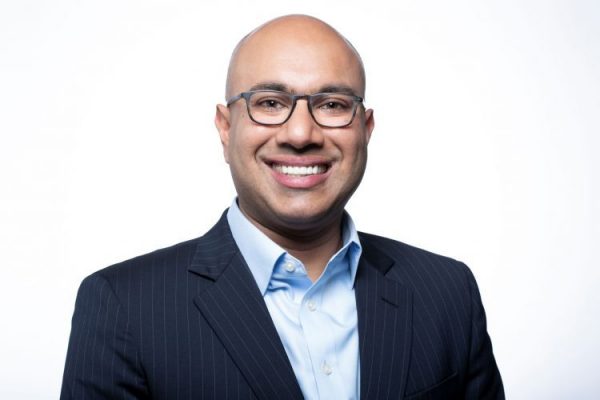
Verana Health President and CEO Miki Kapoor
Verana Health reached a major milestone Wednesday. The San Francisco-based company closed a $100 million funding round led by GV (formerly known as Google Ventures) and made its first major acquisition, buying data analytics company PYA Analytics.
The company provides tools for physicians using de-identified data from patient registries, including software that gives physicians a view of how their practice is performing, and tools that can track what factors lead to better outcomes for patients with ophthalmic or neurologic conditions, such as dementia or epilepsy.
The process to get there hasn’t been easy. It involved a company pivot and striking deals with two large physicians groups: the American Academy of Ophthalmology and the American Academy of Neurology.
Verana CEO Miki Kapoor said the company stood apart from other healthcare data companies because its focus is on the relationship between physicians and patients.
“I’ve worked in the healthcare data world for a lot of years, and I have not seen an organization that delivers anywhere near the value to patients and physicians,” he said.
Kapoor joined Verana Health in 2018, after more than 20 years working in healthcare. He most recently was president of Tea Leaves Health, which sold to WellTok for $80 million in 2017. He has also served as president of wellness site Everyday Health and head of IMS Health’s global payer and provider business.
When he joined the company in 2018, Kapoor had a large task ahead: pivoting a tele-ophthalmology company into a healthcare data company. Verana, then called DigiSight, had just raised $30 million in funding, led by GV. The startup had been looking to make the shift for a while, and was able to make the leap after striking a deal with the American Academy of Ophthalmology.
“It’s never easy to start with something that’s already existing. It comes with its own culture and its own focus,” Kapoor said. “And you have to think about whether that’s the right thing to do.”
Kapoor had two options: build a new company from the ground up or work with the existing foundation. Kapoor chose the latter, which saved Verana a year of work and allowed the company to keep its current team. The company didn’t have all the needed technology in place, but it did have ophthalmology data and data scientists that could interpret it.
“It allowed us to start anew without having to start from scratch,” Kapoor said.
The company first struck a deal with the American Academy of Ophthalmology (AAO), which would allow Verana to access its IRIS registry. It took an extensive, six-month review to close the agreement.
Kapoor didn’t disclose the terms of the deal, but did note it was an exclusive partnership.
“They’re signing an exclusive deal. They want to make sure they’re picking the right partner for the physicians, to whom they’re ultimately accountable,” Kapoor said. “The thing that mattered to them most was alignment with their mission.”
In 2019, Verana struck a similar agreement with the American Academy of Neurology (AAN). Kapoor said Verana structured its governance to ensure the company will still be in tune with both associations’ missions in the future. The CEOs of AAO and AAN both have seats on Verana’s board, alongside the company’s co-founders and investors GV and Biomatics Capital Partners.
“Before (AAO and AAN) were doing this, physicians had no time. Rarely do you get the opportunity to step back, look at your career and daily work and say, how am I doing?” Kapoor said. “That data has a tremendous amount of value to the entire healthcare ecosystem as well.”
Verana still uses this data to give physicians a snapshot of how their practice is doing. For example, they’ll be able to see patient outcomes based on what therapeutic or service was provided, and how they performed compared to care guidelines.
The company also developed a clinical trial dashboard to help clinicians identify patients in their practice that might be eligible for a clinical trial. That feature, called Verana Trial Connect, opens genetic screening for patients with inherited retinal diseases, who currently lack treatment options.
“We realized with data, you can do so much good. We’ve created this strong ethos of trying to help patients as much as possible,” Kapoor said.
Verana is also working with the 10 largest ophthalmology companies to answer clinical questions, such as how their product is operating in the real world compared to clinical trials.
“It is very important to us because what we’re doing now is delineating value of products in the market,” he added.
Of course, with all of that data comes privacy questions. Unfortunately, patients don’t get much of a say on whether they’re included in the database, since physicians are the ones that choose whether or not to submit data to these registries.
Since Verana works with these organizations as a business associate, it falls under HIPAA. Kapoor said all of Verana’s work is conducted with de-identified data, and everything has to be done for scientific purposes.
“We are committed to facilitating meaningful scientific discoveries, and we have to do that while maintaining privacy for patients,” Kapoor said. “It’s a big part of what we do, and we want to make sure patients are comfortable with what we’re doing.”
In the future, Verana looks to expand into other specialties by striking agreements with physician groups. It also plans to add imaging, genomic and claims data, in part through its acquisition of PYA Analytics.
Photo credit: Verana Health












